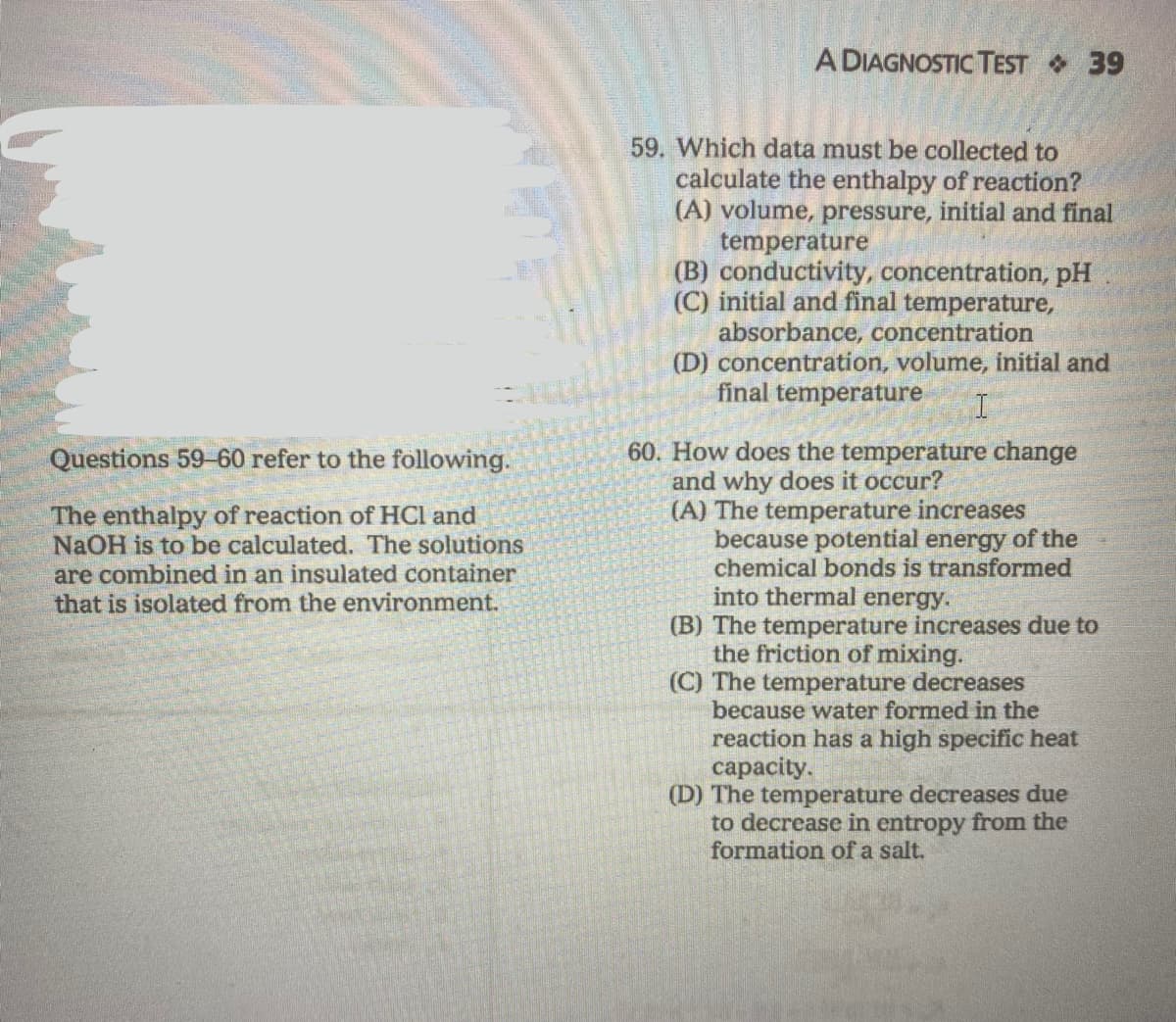A DIAGNOSTIC TEST 39 59. Which data must be collected to calculate the enthalpy of reaction? (A) volume, pressure, initial and final temperature (B) conductivity, concentration, pH (C) initial and final temperature, absorbance, concentration (D) concentration, volume, initial and final temperature 60. How does the temperature change and why does it occur? (A) The temperature increases because potential energy of the chemical bonds is transformed into thermal energy. (B) The temperature increases due to the friction of mixing. (C) The temperature decreases because water formed in the g. ons ner t. reaction has a high specific heat сарacity. (D) The temperature decreases due to decrease in entropy from the formation of a salt.
A DIAGNOSTIC TEST 39 59. Which data must be collected to calculate the enthalpy of reaction? (A) volume, pressure, initial and final temperature (B) conductivity, concentration, pH (C) initial and final temperature, absorbance, concentration (D) concentration, volume, initial and final temperature 60. How does the temperature change and why does it occur? (A) The temperature increases because potential energy of the chemical bonds is transformed into thermal energy. (B) The temperature increases due to the friction of mixing. (C) The temperature decreases because water formed in the g. ons ner t. reaction has a high specific heat сарacity. (D) The temperature decreases due to decrease in entropy from the formation of a salt.
Principles of Modern Chemistry
8th Edition
ISBN:9781305079113
Author:David W. Oxtoby, H. Pat Gillis, Laurie J. Butler
Publisher:David W. Oxtoby, H. Pat Gillis, Laurie J. Butler
Chapter17: Electrochemistry
Section: Chapter Questions
Problem 20P
Related questions
Question
100%
Teacher said we don’t need to provide the work just the answers. Please help with 59&60

Transcribed Image Text:A DIAGNOSTIC TEST 39
59. Which data must be collected to
calculate the enthalpy of reaction?
(A) volume, pressure, initial and final
temperature
(B) conductivity, concentration, pH
(C) initial and final temperature,
absorbance, concentration
(D) concentration, volume, initial and
final temperature
60. How does the temperature change
and why does it occur?
(A) The temperature increases
because potential energy of the
chemical bonds is transformed
into thermal energy.
Questions 59-60 refer to the following.
The enthalpy of reaction of HCl and
NAOH is to be calculated. The solutions
are combined in an insulated container
that is isolated from the environment.
(B) The temperature increases due to
the friction of mixing.
(C) The temperature decreases
because water formed in the
reaction has a high specific heat
capacity.
(D) The temperature decreases due
to decrease in entropy from the
formation of a salt.
Expert Solution
This question has been solved!
Explore an expertly crafted, step-by-step solution for a thorough understanding of key concepts.
Step by step
Solved in 2 steps with 2 images

Knowledge Booster
Learn more about
Need a deep-dive on the concept behind this application? Look no further. Learn more about this topic, chemistry and related others by exploring similar questions and additional content below.Recommended textbooks for you

Principles of Modern Chemistry
Chemistry
ISBN:
9781305079113
Author:
David W. Oxtoby, H. Pat Gillis, Laurie J. Butler
Publisher:
Cengage Learning

Chemistry by OpenStax (2015-05-04)
Chemistry
ISBN:
9781938168390
Author:
Klaus Theopold, Richard H Langley, Paul Flowers, William R. Robinson, Mark Blaser
Publisher:
OpenStax

Principles of Instrumental Analysis
Chemistry
ISBN:
9781305577213
Author:
Douglas A. Skoog, F. James Holler, Stanley R. Crouch
Publisher:
Cengage Learning

Principles of Modern Chemistry
Chemistry
ISBN:
9781305079113
Author:
David W. Oxtoby, H. Pat Gillis, Laurie J. Butler
Publisher:
Cengage Learning

Chemistry by OpenStax (2015-05-04)
Chemistry
ISBN:
9781938168390
Author:
Klaus Theopold, Richard H Langley, Paul Flowers, William R. Robinson, Mark Blaser
Publisher:
OpenStax

Principles of Instrumental Analysis
Chemistry
ISBN:
9781305577213
Author:
Douglas A. Skoog, F. James Holler, Stanley R. Crouch
Publisher:
Cengage Learning

Chemistry: Matter and Change
Chemistry
ISBN:
9780078746376
Author:
Dinah Zike, Laurel Dingrando, Nicholas Hainen, Cheryl Wistrom
Publisher:
Glencoe/McGraw-Hill School Pub Co

Chemistry: Principles and Reactions
Chemistry
ISBN:
9781305079373
Author:
William L. Masterton, Cecile N. Hurley
Publisher:
Cengage Learning

Chemistry: Principles and Practice
Chemistry
ISBN:
9780534420123
Author:
Daniel L. Reger, Scott R. Goode, David W. Ball, Edward Mercer
Publisher:
Cengage Learning